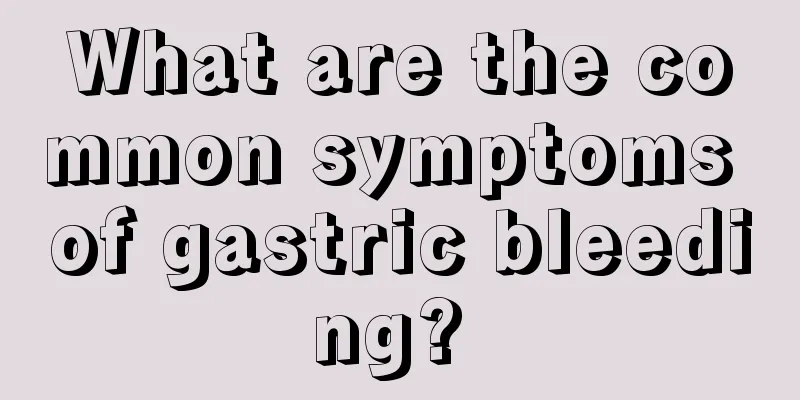What are the common symptoms of gastric bleeding?

|
As we age, our bodies are more likely to have problems. Especially for middle-aged and elderly people, the functions of various organs in the body will decline, which makes it easy to suffer from some more serious diseases. Gastric bleeding is a very common disease among middle-aged and elderly people, but most people don’t know much about this disease. So, what are the symptoms of gastric bleeding? Clinical manifestations of gastric bleeding 1. Vomiting blood and/or black stools It is a characteristic manifestation of upper gastrointestinal bleeding. Patients with bleeding above the pylorus often experience vomiting blood and black stools, while patients with bleeding below the pylorus may only experience black stools. However, lesions above the pylorus with a small amount of bleeding and a slow bleeding rate may only cause black stools, while lesions below the pylorus with a large amount of bleeding and a fast bleeding rate may cause vomiting of blood due to the reflux of blood into the stomach. 2. Hemorrhagic peripheral circulatory failure Bleeding within 400ml may be asymptomatic, while moderate bleeding may cause anemia or progressive anemia, dizziness, weakness, and sudden standing up may cause syncope, thirst, cold limbs, and low blood pressure. Massive bleeding reaching 30% to 50% of the total blood volume can cause shock, which is manifested as irritability or confusion, pale complexion, cold and clammy limbs, cyanosis of the lips, difficulty breathing, blood pressure dropping to unmeasurable levels, decreased pulse pressure difference, and a rapid and weak pulse. If not handled properly, it can lead to death. 3. Azotemia. 4. Anemia and blood picture changes After acute massive hemorrhage, there will be hemorrhagic anemia. In the early stage of bleeding, there may be no obvious changes in hemoglobin concentration, red blood cell count and hematocrit. Generally, it takes more than 3 to 4 hours for anemia to appear. After 2 to 5 hours of massive upper gastrointestinal bleeding, the white blood cell count may increase significantly and return to normal 2 to 3 days after the bleeding stops. However, in patients with cirrhosis and hypersplenism, the white blood cell count may not increase. 5. Fever In cases of moderate or massive bleeding, fever occurs within 24 hours, mostly below 38.5 degrees, and lasts for several days to a week. If you find yourself having any of the above symptoms, you should go to the hospital and have a doctor check you out as soon as possible. Only when the cause is found can you receive a thorough treatment. It is recommended that you must eat on time, do not eat irritating foods on an empty stomach, and do not drink milk on an empty stomach, as these will cause damage to the stomach. At the same time, you should not overeat and should chew your meals slowly. |
<<: When is the best time to run?
>>: Will gastric bleeding heal on its own without treatment?
Recommend
Will nasopharyngeal carcinoma recur after treatment? How to prevent it?
If cancer recurs after treatment, the consequence...
Infants with pseudo-overbite do not need treatment
It is easy for children to develop a false overbi...
What are the three layers of the eyeball wall?
Eyes, as windows to the soul, play a very importa...
Benefits of hot towel compress on neck
Using a hot towel to apply to the forehead can ef...
Are tattoos harmful to the skin?
Nowadays people love beauty very much and always ...
What to do if the face is asymmetrical_How to correct asymmetrical face
Our country pays attention to the beauty of symme...
Do potatoes have pollen?
Potatoes are a very familiar vegetable to everyon...
If my mother has polycystic kidney disease, will it be inherited?
Many people are familiar with polycystic kidney d...
Does high jump help you grow taller
Poor height development and short stature are iss...
How to cut mango better
In fact, many people will find that although mang...
What ointment should I use when my nails grow into flesh
If the nails are not cut correctly, they will eas...
What are the typical symptoms of viral encephalitis in children?
Children are a high-risk group for viral encephal...
What are the treatments for lumbar bone hyperplasia
Osteoporosis is a type of arthritis that is very ...
What are some ways to make your buttocks more perky?
In daily life, long-term sitting at work can easi...
How can I cure fibroids?
With the improvement of living standards, people&...









